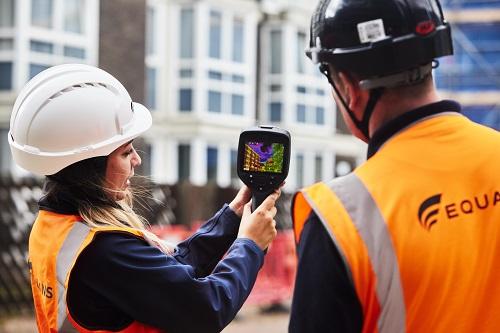Empowering the skills for a greener future
For National Apprenticeship Week 2024, Equans' Head of Resourcing Matt Bloice appraised the vital role of apprenticeships and early careers as part of the green skills revolution required in the fight against climate change: including current challenges in the labour market and what employers can do to help futureproof the workforce.
This content originally featured in Business Green.
This week marks National Apprenticeship Week, serving as a timely reminder of the crucial role apprenticeships and early careers play in the green skills revolution needed to combat climate change. The theme for this year, "Skills for Life," reflects not only on the long-lasting impact of apprenticeships on individuals but also the vocational career path's contribution to the UK's growth and net-zero ambitions.
As a resourcing leader in the technical & energy, sustainable FM and regeneration sectors, which are at the cutting edge of driving net zero within the built environment - I witness a recurring theme in the need to develop a workforce that both meets the needs of today but also future demands as the energy transition changes the way we all move, work and live.
In the short term, low carbon technologies such as solar PV, heat pumps and EV's are already moving the dial towards a low carbon future. It is estimated that about 80% of the buildings in the 2050 net zero economy already exist - so there is a massive need for technical engineering and project management skills as efforts are made to scale-up decarbonisation of existing buildings & infrastructure. In addition, emergent industries such as Hydrogen and Carbon Capture, Utilisation & Storage (CCUS) hold immense potential for green job creation over the coming decades.
At the same time, there is a current shortage of skilled workers in key technical & engineering roles and this is already having a negative impact: A shortage of heat pump installers has been blamed for a lack of uptake on the Government's recent boiler upgrade scheme with only half the budget being used before the recent grant increase.
There is a real risk that a lack of skills will hold back efforts to decarbonise the economy and slow down progress towards the UK's net zero targets. Generation Z are a workforce which will spend most of their careers in an economy transitioning to net zero, therefore when it comes to equipping them with the relevant green skills, it's vitally important to get it right.
Whilst Generation Z are more climate conscious than previous generations, a recent report from The Prince's Trust and Public First has pointed to young people's awareness and interest in green jobs as being worryingly low. So what can be done to help ensure that this enthusiasm for a more sustainable world translates into the green skills the UK so desperately needs?
Firstly, collaboration between the government and industry is crucial - and this needs to drive the development of new early career & apprenticeship routes as well as a review of the apprenticeship levy. As hiring organisations such as Equans plan their current and future workforce, we can identify the skills which are most in need - and a levy which creates greater flexibility and quality of training options would better enable us to deliver comprehensive apprenticeship schemes. Currently, a significant portion of the levy goes unused.
Proactivity is also required from hiring organisations when investing in the next generation of skilled professionals. At Equans our apprenticeship programme boasts 592 apprentices & 45 graduates, and we place emphasis on retaining apprentices post-scheme and providing additional support for those with high potential.
We have also just launched a specialist apprenticeship programme focusing on digital and data skills as part of a broader drive to equip our teams with new essential skills for the digital work environment.
Ensuring diversity is also essential to find the best skilled professionals for delivering green jobs, however diversity remains a challenge in the industry - currently only 19% of engineering and technology students are women and females are still majorly underrepresented in STEM fields. To help address this Equans is delivering initiatives like the 'Girls Believe Academy' which offers opportunities and pathways into STEM roles. Through the academy, our network of 40 ambassadors has collaborated with over 20 schools so far, reaching thousands of students to help inspire and empower young women to explore STEM careers.
There is also an opportunity to create social value alongside the creation of green skills by targeting opportunities to groups of people who have historically been underrepresented. Equans has signed up to all three of the UK Government's covenants; Armed Forces Covenant (AFC), Employers Domestic Abuse Covenant (EDAC) and Care Leavers Covenant. As part of these commitments, our teams maximise employment and skills opportunities for individuals across the UK and contribute to levelling-up.
As a greener economy changes the work we do, it's also important to invest in upskilling of the existing workforce - in recognition of this our Equans Academy is delivering over 50,000 training days annually to our own employees. The company has also collaborated with Pushfar to launch a mentoring platform to assist continuous professional development particularly for operational teams. Attracting and retaining the best talent must also be supported by a compelling employee experience and we take opportunities to celebrate the positive decarbonisation impacts our employees make in their daily work.
Green skills are essential to reach net zero - but we must act now to overcome the challenges which have the potential to hinder progress including shortages of qualified technical professionals and a gap in STEM education among the emerging generation.
It is vital for sectors to collaborate in fostering a talent pool capable of driving the nation toward a greener and more sustainable future, and whilst we don't have all the answers, Equans' journey serves as an illustration of how companies can proactively address these skills gaps.
